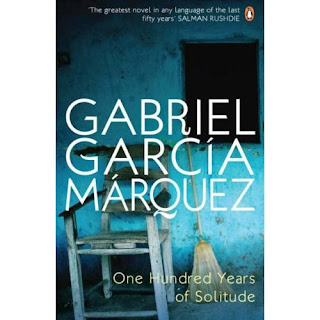"During that interminable night, while Colonel Gerineldo Marquez thought about his dead afternoons in Amaranta's sewing room, Colonel Aureliano Buendia scratched for many hours trying to break the hard shell of his solitude." How we can empathise with Colonel Aureliano Buendia, as we become more and more engrossed in One Hundred Years of Solitude we soon realise the book has in turn made us one of the many isolated figures the book depicts.
Usually in this part of the blog I would give a general overview regarding the book, unfortunately in a book of this scale it is hard to say what the book is "about." One Hundred Years of Solitude is the quintessential postmodernist text, it uses the abstract and the unusual to form a tale of epic proportions. Even the characterization is bizarre, within 420 pages of literature there are over twenty characters whom at some point could be considered the "main character," only to consequently die and be replaced.
If this book is about anything it is about the passage of time and how time is recorded through the experience of our families. There is little description that can be added to that; that will not give away the plot or under-sell the story in some way. The only narrative point that seems pertinent is that offered by the blurb; "Through plagues of insomnia, civil war, haunting and vendettas, the many tribulations of the Bunedia household push memories of the manuscript aside. Few remember its existence and only one will discover the hidden message that it holds..."
To close, this is perhaps the most ambiguous of all my blog posts but unfortunately there is little I can say to do service to such a marvellous book. A book of such epic proportions and huge scale can only be understood through reading. Reading is all too frequently described as an "experience," or an "adventure," but if there was ever a time for such clichés this is it.
Thursday 26 January 2012
Saturday 7 January 2012
Douglas Coupland; The Gum Thief
Douglas Coupland first came to worldwide recognition as the author of, Generation X: Tales for an accelerated culture. This novel, published in the 1990s, came to be regarded as the definitive text of the generation defined by new technologies and greedy capitalism. Not to sound pretentious but Generation X can be regarded as one of the first pieces of; post, post modern literature. The Gum Thief explores the greed and tedium of greed caused by the system of exploitative capitalism we live under today.
In The Gum Thief we are presented with a middle-aged and divorced counter assistant named Roger. He is employed at the stationary giant "Staples" which he frequently refers to as "Stooples." Sick of his mundane life he begins a friendship with fellow employee Bethany. Unfortunately for Roger Bethany reads his diary wherein he pretends to be her, just to make things more perturbing and confusing he also writes a story simultaneously known as Glove Pond which is a fictional exaggerated version of his own life. Think of "The Mousetrap" in Shakespeare's Hamlet for a similar comparison. Just to add to the mystery around this novel it is written in an epistolary manner meaning we are presented with several stories rather than one story in a linear sequence. Confused? Good.
The Gum Thief is self consciously post modern. With metafiction and the epistolary format even the structure is interesting. The novel is superbly written and is entertaining throughout. There are numerous surprises and the novel written with grace and an intelligent aloofness. Perhaps the only criticism that could be levelled is that the way in which the novel is written means there is no grand complex moral message. Other than this, an amazing novel well worth a read.
In The Gum Thief we are presented with a middle-aged and divorced counter assistant named Roger. He is employed at the stationary giant "Staples" which he frequently refers to as "Stooples." Sick of his mundane life he begins a friendship with fellow employee Bethany. Unfortunately for Roger Bethany reads his diary wherein he pretends to be her, just to make things more perturbing and confusing he also writes a story simultaneously known as Glove Pond which is a fictional exaggerated version of his own life. Think of "The Mousetrap" in Shakespeare's Hamlet for a similar comparison. Just to add to the mystery around this novel it is written in an epistolary manner meaning we are presented with several stories rather than one story in a linear sequence. Confused? Good.
The Gum Thief is self consciously post modern. With metafiction and the epistolary format even the structure is interesting. The novel is superbly written and is entertaining throughout. There are numerous surprises and the novel written with grace and an intelligent aloofness. Perhaps the only criticism that could be levelled is that the way in which the novel is written means there is no grand complex moral message. Other than this, an amazing novel well worth a read.
Subscribe to:
Posts (Atom)


